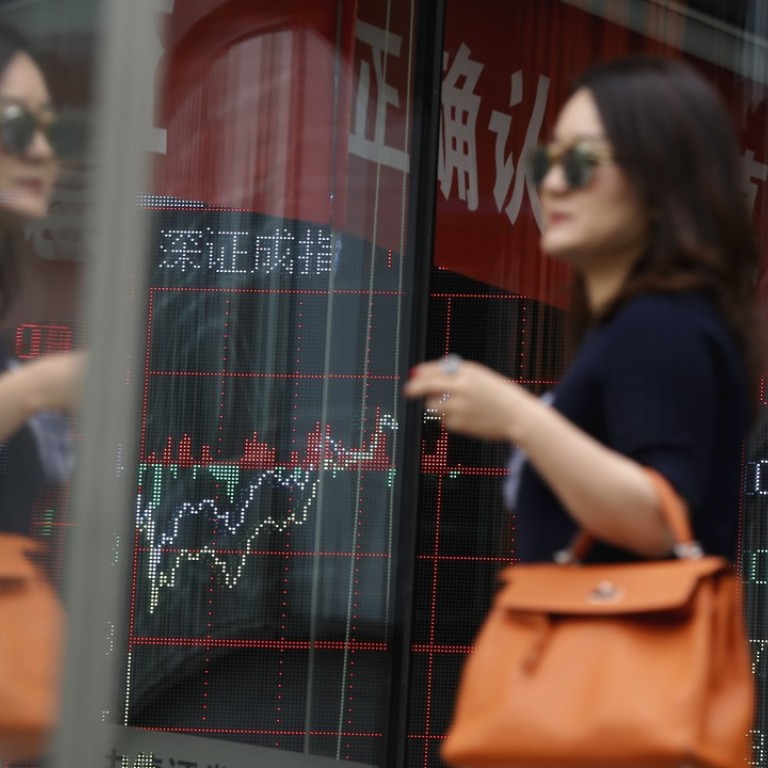
China stocks fall to three-and-half month low as commodity futures sink
Sentiment nosedives as renewed regulatory clampdown, growth concerns unnerve investors
Mainland shares fell for the fourth day in succession to a to three and a half month low on Friday as sentiment remained lacklustre amid plunging commodity futures, falling economic growth and renewed regulatory tightening.
Hong Kong stocks also closed at the lowest level in more than a week, dragged down by the weakness in mainland markets.
Analysts said investors have been spooked by regulators’ sweeping measures to curb leverage in the financial system, which caused a liquidity squeeze in both equity and commodity markets. Recently-released economic data indicated that the Chinese economy is losing momentum, which also fuelled concerns that demand for commodities is weakening, weighing on the futures and related stocks.
The Shanghai Composite Index dropped 0.8 per cent, or 24.33 points, to close at 3,103.04, the weakest since January 19. For the week, the index fell 1.6 per cent, down for a fourth week in a row.
In the past four weeks, the Shanghai Composite Index had lost 5.6 per cent.
The large-cap CSI300 erased 0.6 per cent, or 21.84 points, to end at 3,382.55. The Shenzhen Composite Index and the startup board ChiNext index shed 1.2 per cent and 1.1 per cent each, finishing at 1,872.79 and 1,818.19.
We expect demand for commodities from infrastructure projects to weaken significantly
The combined turnover for the Shanghai and Shenzhen markets decreased 4 per cent to 436.7 billion yuan (US$63.3 million) from Thursday.
The sharp drops in the equity markets coincided with the sharp sell-off in commodity futures, with iron ore down by its daily limit of 8 per cent and coking coal off more than 4 per cent, on Friday.
“‘Credit tightening’ – the new buzzword – triggered the latest sell-off. Credit tightening is the consequence of the financial deleveraging policy, which President Xi Jinping leaned into in his Politburo speech in late April,” said Tim Condon, an economist for ING Asia.
“Coupled with increased regulatory scrutiny of banks’ exposures to wealth management products, fears of a deleveraging-driven hard landing have resurfaced.”
Wang Dong, an analyst for Guangzhou Futures, said, “We expect demand for commodities from infrastructure projects to weaken significantly, after six government agencies on Wednesday pledged to further tighten local government debt issuance and financing.”
Coal miners and steel makers were among the major losers on Friday.
Yanzhou Coal Mining sank 5.8 per cent to 11.23 yuan. Shaanxi Coal Industry declined 4.7 per cent to 5.51 yuan, while Angang Steel dropped 2.1 per cent to 5.14 yuan.
Among newly-listed shares, Hamaton Automotive Technology Company, which manufactures and distributes automotive parts and tires, rose by its daily allowable limit of 44 per cent to 6.19 yuan from the initial public offering price of 4.30 yuan.
Hangzhou Landscape Architecture Design Institute Company, a landscaping company, also rose by its 44 per cent daily limit to 13.02 yuan,up from the public offer of 9.04 yuan.
Jiangyin Hengrun Heavy Industries Company, which makes forgings and shafts for power plants, jumped to 38.84 yuan in its Shanghai debut, up 44 per cent from the offer price of 26.97 yuan.
In Hong Kong, the Hang Seng Index dropped 0.8 per cent, or 207.53 points, to close at 24,476.35, the lowest since April 25. The index fell 0.6 per cent for the week.
The Hang Seng China Enterprises Index, known as the H-shares index, fell 1.6 per cent, or 161.76 points, to 9,926.26. The index had fallen for five straight sessions, down a combined 3.8 per cent. It was also the longest losing streak in two months.
Daily turnover for the Hong Kong market increased to HK$81.1 billion, up from Thursday’s HK$79.7 billion.
“The (Hong Kong) market is losing steam because there is a lack of positive Chinese company earnings news after last week’s strong rally,” Kingston Lin, director at AMTD Securities said. “The correction is probably going to extend further, breaking the 10-day moving average.”
In Hong Kong, Yanzhou Coal Mining’s H shares tumbled 4.8 per cent to HK$6.2. China Coal Energy lost 4.9 per cent to HK$3.52 and Shougang Fushan Resources by 5.1 per cent to HK$1.31. Chongqing Iron & Steel Company gave up 3.5 per cent to HK$1.1.
The sell-off in commodity futures also spread to oil markets. Crude futures dropped further in Asian trading hours on Friday, after losing nearly 5 per cent by the close of regular trading in New York on Thursday, marking the lowest settlement level since November.
PetroChina shares pulled back 2.4 per cent to close at HK$5.24 and CNOOC by 1.1 per cent to HK$8.82.
The People’s Bank of China is scheduled to publish foreign exchange reserves data on Sunday. Consensus forecasts are for US$3.02 trillion, representing a slight rise, Haitong Securities wrote in a note.


